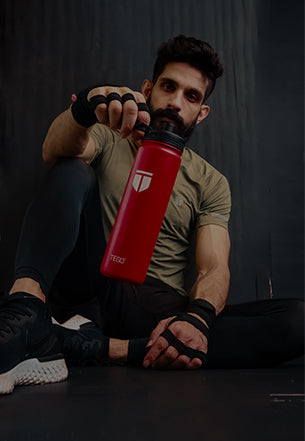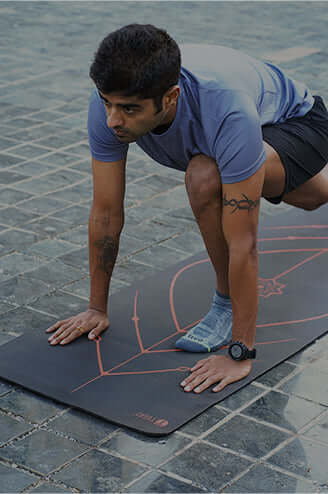Nakul Butta of All In Running is a vital player in India’s running eco-system. This top finisher of major races across India not only works with runners to push their boundaries, but he’s also building a community for like-minded people who subscribe to an active lifestyle.
At times, running can be a solitary sport. It’s an aspect many veteran long-distance runners will tell you they find solace in. And yet, the same runners will also tell you that there is strength in numbers. If we are to unravel dualities such as this, it would be fitting to rope in a runner to tell it like it is. New Delhi-based Nakul Butta is an accomplished amateur long-distance road and trail runner and a certified marathon running coach. He runs a long-distance running platform called All In Running which has for years been working with both active runners and beginners to discover their potential through personalized training services.
We were introduced to Nakul through a series of talks that All In Running presents for fitness enthusiasts in New Delhi. Known as ‘Community Talks’, they bring to the fore running and adventure stories in a bid to inspire like-minded people on their active journeys. Those who attend are almost always serious about running and the outdoors; they attend to gain insights from veteran runners and adventurers, and to share their own stories too. There are some who have experienced the elusive runner’s high, and others who have merely heard about it. And so, when it comes to running, we learn that there is strength in numbers after all. And, we aren’t just talking about group runs.
All In Running also hosts a series of trail running camps to encourage individuals to explore, tackle mountain trails, push boundaries and connect with the environment around them. Nakul’s own love for running, and the resultant launch of All in Running, stems from his passion for the outdoors, nature and the environment. At the time of reaching out to him for this interview, he was about to embark on a mountaineering course. “It’s my life’s mission to help create a positive environmental impact on this planet. To do so, I must connect people with nature and the outdoors — it’s the only way of achieving this mission of positively impacting the environment,” says Nakul, for whom All in Running is a full-time commitment.
When he isn’t crafting training schedules for clients or dreaming up future editions of Community Talks, he pushes his own boundaries as a distance runner. Nakul who had an active childhood and played basketball for school and college teams, says that his earliest memory of running was when he was 5 or 6 years old. “I used to run laps of Lodhi Gardens in New Delhi. My dad used to walk a loop of 2 km and I used to run two loops. I guess that was my introduction to running and it feels like I’ve come full circle now that running is a full-time gig for me.”

How and when did your interest in (distance) running begin?
In 2010, one of my friends was planning to run the Seattle Rock’n’Roll half marathon and I was requested to be her training partner. Over the next few months, we followed a structured training program and built our endurance and stamina. Over this time, I discovered the joys and benefits of distance running and have been hooked since!
Tell us about the distance runs you’ve participated in and which among them was the most challenging?
I prefer not to count trail races and marathons, but it’s fair to say that I’ve done quite a few over the years. Typically, I participate in 3-6 events in a year, setting aggressive targets in 2-3 events among those — where we race for a certain goal (mostly time-based).
Every target race is challenging in its own way as we are pushing physical and mental limits. A 16-minute 5K race is as hard as a sub-3-hour marathon. Then there are 80-100 km ultra marathon races on mixed surfaces and varied conditions. Mountain trail races with thousands of metres of elevation come with their own set of challenges — training for them on the flat terrain of Delhi is far from ideal.
I’ve had some really good/ strong races and some really tough ones. While I have completed the Run the Rann 101 km race (I actually ran 110+ km because of a wrong turn), it was an extremely hard race and I had to dig deep to reach the finish line. The Hell Race’s Solang SkyUltra around Manali was one of my first few ultra marathons – I remember it being one of my toughest mental battles.
Your thoughts on mental preparation before runs.
We do different types of runs – easy/ fun runs, long runs, hard workouts etc. There is a good amount of preparation and planning done before each run. Long runs require gear planning and fueling prep. One has to be “ready to go” for hard workouts as it pushes us to the limit. We have to visualize the “pain zone” and prepare ourselves to go through it. Knowing that all the hard work brings us closer to our goal, be it a faster race, a longer run or another, is the primary driver.
What’s the most challenging part about running?
The most challenging part is the time commitment. Running takes time! One has to run at least 4-5 times per week, if not more. If you miss 5-10 days of running, fitness levels plummet — so one has to be consistent with it. Finally, running is not only just running. One has to focus on a good post-run physiotherapy exercise routine (medicine to running) and strength training. All of this takes time and commitment.

How can novice runners overcome both physical and mental obstacles?
Set targets! Train for your wellness and not to impress others or to chase numbers. As long as you see a measurable positive impact and you move closer to your targets, you’re doing awesome!
The biggest piece of advice to novice runners – take it slow and don’t overdo it. Think of the long term (10 years of fitness and not 3 months). Most beginners run way too fast and try to run too much too soon, which results in knee pain and other issues. Use a structured plan and be conservative in your approach. There are many free tools available online to help with your journey (or get in touch with a coach or an active friend).
To overcome your personal battles, keep reminding yourself why you’re doing this – keep the goal in sight. Some days, you just have to ‘fake it till you make it’. Some days are much easier and others are outright fun. Celebrate this mix and move forward. Train with others or in groups every once in a while to create a supportive atmosphere around you.
What would your advice be to top amateur runners?
Write down what you are targeting and why. The ‘why’ is critical. Since this group (top runners) trains at a high intensity and are very goal driven, sometimes the ‘why’ is forgotten. For example, with race day approaching, training load is high and there is also lots of fatigue pile-up. Despite warning signs, some runners keep training hard and don’t back off as it may compromise peak race performance. This results in injury and jeopardizes race performances. There are many such scenarios and a coach plays a critical role as a sound board to prevent such mistakes.
What’s your daily workout/ training regime like?
When training, I run 6 days in a week. While preparing for an event, I run twice on some days and cover anywhere from 70-130 kms per week. Majority of the running is easy, but the week also includes hard workouts and long runs.
In addition, I follow a daily exercise routine and try to add some strength training to support my running and other activities. If time permits, I love to do some climbing on an artificial wall. I try to take short breaks to spend time in the mountains – expeditions, hikes or trail runs.
More about All In Running on their Facebook Page.
Follow Nakul's running and adventures on Strava.
Listen to Nakul's story on The Pursuit of Wellness podcast.








